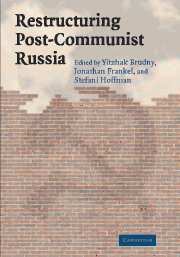Book contents
- Frontmatter
- Contents
- Contributors
- Preface
- Restructuring Post-Communist Russia
- INTRODUCTION
- THE COMPARATIVE DIMENSION
- What went wrong? Post-communist transformations in comparative perspective
- Communist legacies and new trajectories: Democracy and dictatorship in the former Soviet Union and East Central Europe
- Learning from post-socialism
- Ukraine's hollow decade
- RUSSIA IN FREE FALL? KEY CHALLENGES
- THE RUSSIAN POLITICAL SYSTEM: TOWARD STABILIZATION?
- Index
Communist legacies and new trajectories: Democracy and dictatorship in the former Soviet Union and East Central Europe
Published online by Cambridge University Press: 25 July 2009
- Frontmatter
- Contents
- Contributors
- Preface
- Restructuring Post-Communist Russia
- INTRODUCTION
- THE COMPARATIVE DIMENSION
- What went wrong? Post-communist transformations in comparative perspective
- Communist legacies and new trajectories: Democracy and dictatorship in the former Soviet Union and East Central Europe
- Learning from post-socialism
- Ukraine's hollow decade
- RUSSIA IN FREE FALL? KEY CHALLENGES
- THE RUSSIAN POLITICAL SYSTEM: TOWARD STABILIZATION?
- Index
Summary
For much of the 1990s the post-communist states fell into three geographically clustered groups of distinct types of regimes: market-oriented democracies in East Central Europe, dictatorships predominately in Central Asia, and parasitic authoritarian regimes in the vast area between East Central Europe and Central Asia. That third group may now be fracturing, with some middle-of-the-road authoritarianisms moving toward democracy and some toward dictatorship. This change of trajectory and the concomitant emergence of two camps are, like the emergence and persistence of the three clusters, for the most part the product of systemic forces inherited from the communist past. If so, overcoming these divisions will not be easy. Only a patient and steadfast commitment to targeted institutional change on the part of these countries and of the West – the United States and the European Union (EU) – may decelerate, deflect, or reverse the trend toward two camps in the medium to long term. Whether such a commitment is likely in the aftermath of EU enlargement and the U.S.-led war on terrorism is, unfortunately, far from certain.
Table 1 groups the post-communist states according to their cumulative scores for a variety of indicators – relating to democracy, the market, rule of law, and civil society – compiled and published by the U.S.-based Freedom House (in its reports on Nations in Transit).
- Type
- Chapter
- Information
- Restructuring Post-Communist Russia , pp. 52 - 67Publisher: Cambridge University PressPrint publication year: 2004
- 1
- Cited by



